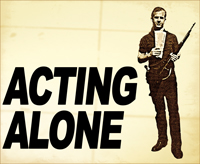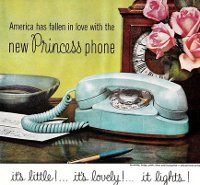
Acting Alone
Today, on the 46th anniversary of the death of JFK, there are still two kinds of people in this world – those who believe that John F. Kennedy was assassinated by Lee Harvey Oswald who was acting alone, and those who believe that Kennedy’s assassination was a highly orchestrated, multiple-person operative with ties to the CIA, the Cuban dictator Fidel Castro, the Mafia and the KGB, among others. Acting Alone by David M. Korn and directed by Lee Gundersheimer brings forth a bit of a third option – that even when someone is acting alone, they are still the product of those around them, and ultimately those loved one share much of the burden, a back-splash of the guilt, and even a whisper of the responsibility.
The life of Lee Harvey Oswald isn’t very noteworthy to American History, rather it is his one single decision to shoot the President that is the story and therefore we rarely (if ever) think about the man as anything but an assassin. But, cliched as it may sound, this man was once a little boy … he had a family, a wife, children of his own. Aside from this drastic action which literally changed the course of history, he was a normal man, if a bit of a jerk. And surprisingly, he was only 24 when he killed Kennedy. Which make his actions seem all the more able to be chalked up to the stupid risks we take when consumed with the restlessness of youth.
Writer David M. Korn goes to great lengths to make sure that ever detail of Oswald’s life is presented to us so that we can make a decision about him based on more than just the actions of his last few days. Whether it’s to deepen the notion of Oswald’s humanity or to underscore that Lee was, in fact, a violent man tortured by his own feelings of insecurity is up to the audience to decide … because the play is written more as a series of facts than as a full on drama.
This style serves the play well early on when Lee (Nick Scoullar) is young and Korn needs to quickly get through setting up the dysfunctional family of older brother Robert (Stephen Graham) and overbearing, vain, pushy, thoughtless, selfish mother Marguerite (Vivian Neuwirth). The trio, san father, never feels grounded … and this notion is carried out through the swift and precise blocking which has the family moving boxes, chairs and other raw forms of scenery that invoke both the Book Depository as well as the transitory feeling of never being settled down. At times, however, the cast moves so often (punctuating every sentence, for instance, with a clunk of the furniture ) that it’s almost like watching a strange game of Musical Chairs.
When Lee meets Marina (Monika Hunken ) the story actually shifts and becomes less of a “here’s the history of the man who killed JFK” and more of a traditional (though no less fascinating) story about a marriage. At first blissful, the pair (who met while Lee had defected to the Soviet Union) fit together in a necessary way; they both fill a specific need for each other which makes them desperately in love. However, circumstance change when the Oswalds move back to America. Lee is dissatisfied with his life and uses all the textbook abusive methods of keeping his wife under his thumb: he keeps her isolated from other Russian-speaking people when she becomes too friendly with them, he does not encourage her to learn English, he beats her, her verbally abuses her and tells her to ‘go back to Russia’. More than once Marina is in such a state of despair that she thinks of suicide. And yet, like many co-dependant couples who both seem to need this ritual of abuse, separation, reunion, repeat, they do this over and over again. The results are bruises, separate apartments, and two children.
It’s here where the writing style seems to act as a barrier between the characters and the audience. By having the Marina and Lee look directly at each other, yet still narrate (for the audience’s behalf) lines about their relationship is a little off putting, thought it does keep Oswald in an isolated state which reinforces the idea of his loner-like personality despite wife and children.
Obviously we all know how Lee Harvey Oswald’s story — or rather, how his life — ended. How his story ended is with those who loved him the best way they could having to deal with what he had done. While his mother insisted that Lee was a secret agent –he’d died for his country and should be buried in Arlington National Cemetery– Marina and Robert are more realistic about what happened, and what their lives are now destined to be.
While you don’t come away from Acting Alone feeling sorry for Lee Harvey Oswald, you do come away from the play with a richer history of who this man was, how he became that way, and who he started hurting long before he fired that fatal shot.
–
Acting Alone November 5 through November 21 2009 Wednesday through Friday at 8:00 pm and Saturday 2:00 pm and 8:00 pm The ArcLight Theatre (152 West 71st Street) Tickets are $18 and available on‐line at www.smarttix.com or by calling (212) 868‐4444.







{ 0 comments… add one now }